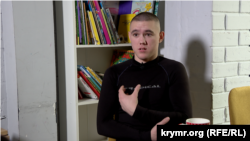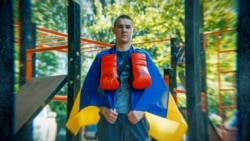Vladyslav Rudenko was 16 years old in October 2022 when three armed Russian soldiers arrived at his home in the southern Ukrainian region of Kherson.
"They came to my apartment and said I had 30 minutes to pack my things, and I had to go with them," Rudenko said.
The soldiers told Rudenko he was being evacuated. He and hundreds of other young Ukrainians boarded buses and were transported to Russian-occupied Crimea with a military escort.
Their destination: a health spa in the seaside city of Yevpatoria that had been repurposed into a training center meant to strip Ukrainian youth of their national identity.
"We were told to get rid of everything Ukrainian, so that there was absolutely nothing Ukrainian, or there would be problems," he said.
Rudenko spent nine months there undergoing Russian military-style training and education in Russian language, culture, and patriotic ideology.
A Ukrainian NGO, Save Ukraine, helped him and others to escape from what Kyiv refers to as a "reeducation camp."
After his return home from Russian-occupied territory, he spoke to RFE/RL about the strict regimen imposed at the center.
"First, we woke up to the Russian national anthem. Then we raised the Russian flag," Rudenko said. "After breakfast, we had an hour of education about what had happened during the evening in Russia. Then we were taken to a cinema to watch Russian films."
The young Ukrainians at the camp were given military uniforms, including the St. George's ribbon, a Russian nationalist symbol, Rudenko said. They were told to take shifts standing guard.
"It was constantly a vicious cycle where nothing changes," he said.
"This is a very large pro-Russian machine, and it was very difficult."
Ukrainian officials estimate that occupying forces have taken some 20,000 Ukrainian children from their families and sent them to Russian-controlled parts of Ukraine or locations in Russia and its ally, Belarus.
Some have been placed with Russian foster families or at boarding schools, while others have wound up in camps like the one where Rudenko was held.
Mykola Kuleba, Ukraine's commissioner for children's rights and the founder of Save Ukraine, described the camps as a form of "cultural genocide" intended to foster loyalty to Russia.
"This is the technique that the Russian Empire used in order to quickly assimilate the population after conquering new territories, to make them obedient to the regime," Kuleba said.
"The main thing is to resettle [them] and start reeducation. That is, to see what needs to be done in order to get these children obedient to the [Putin] regime as soon as possible. Make them ready to live in the Russian Federation and continue to send them to Russia, to families, to boarding schools."
Save Ukraine has organized the return of 610 children from Russia and Russian-occupied parts of Ukraine, Kuleba said. Ukrainian officials state that a total of about 1,300 children have returned to Ukraine after being taken by Russia.
According to the Yale Humanitarian Research Lab, more than 8,400 children from Ukraine have been systematically relocated to at least 57 facilities: 13 facilities in Belarus and 43 facilities in Russia and Russian-occupied territory.
A statement recently released by the office of Ukrainian President Volodymyr Zelenskyy said that "without the return of the children abducted by Russia, the war cannot truly be considered over."













